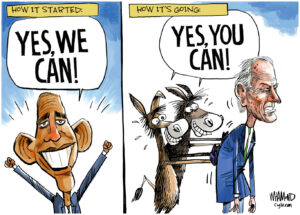Who Wants to Go Back to the ’50s?
Obama's Eisenhower nostalgia is troubling. That was half a century ago—before the Civil Rights Act, the Voting Rights Act, Medicare, Medicaid, food stamps and federal aid to education.
Of all the ways President Barack Obama tried to rationalize his surrender to the Republicans, none was more infuriating than when he said the deficit deal would lead to the “lowest level of annual domestic spending since Dwight Eisenhower was president.”
Since Eisenhower was president? That was half a century ago — before the Civil Rights Act, the Voting Rights Act, Medicare, Medicaid, food stamps and federal aid to education, including Head Start.
“These programs defined America as a decent, yes, a Great Society,” Democratic Sen. Tom Harkin of Iowa said Monday during the debate on the so-called compromise debt settlement. What President Obama supported, he said, was “tantamount to repeal of the Great Society.”
Obama’s reference to Eisenhower is an extreme example of how he has raced toward the center since the Republicans captured the House of Representatives and almost took the Senate in 2010.
Some White House wordsmith, maybe born after Eisenhower left office in 1961, no doubt thought the reference to the stultifying Ike presidency would be a powerful illustration of Obama’s centrism. But that’s not what his supporters expect of a president who had promised the country an activist government that would extricate us from futile wars and concentrate on rebuilding a nation left in debt and economic failure after eight years of George W. Bush.
When Obama appeared in the Rose Garden after Congress had finished with the bill on Tuesday, he said, “We’ll need a balanced approach where everything is on the table.” His words ignored the fact that his opponents are unbalanced. Their goals are to beat him in 2012 and roll back every progressive step that government has taken in the last half-century. And that’s just what he should have told the American people.
Obama will be campaigning for re-election in a nation that badly needs a progressive president.
A powerful example of that is unemployment, which stands at 9.2 percent. Hit hardest, the U.S. Labor Department says, are African-Americans at 16.2 percent unemployed and Hispanics at 11.8 percent. Of those, 6.3 million have been out of work for 27 weeks or more, comprising one of the nation’s greatest problems, the long-term unemployed. An extension of unemployment benefits for them didn’t make the compromise cut on Tuesday, another blow to the economy. In addition to the outright unemployed, another 8.6 million are classified as involuntary part-time, meaning they have had to accept part-time work because they can’t find full-time jobs.
The depth of joblessness is reflected in numbers from statehouses around the country — statistics that seldom rise to national attention. The Center on Budget and Policy Priorities, which closely follows financial matters in the states, says that “state actions will continue to be a drag on the national economy, threatening hundreds of thousands of private- and public-sector jobs, reducing the job creation that otherwise would be expected to occur. … State shortfalls could cost the economy 650,000 public- and private-sector jobs next year. …”
Obama did manage to save some of the safety net. The final deal exempted Social Security, Medicaid, Medicare benefits, as well as government and military retirement from cuts. It also saved some other programs for low-income families, according to a White House fact sheet on the deal. Pell Grants financing college educations for needy students were spared. In fact, they will be increased by $17 billion next year and in 2013.
And further details of the deal may justify the argument of supporters that it could have been worse. Of the $2 trillion in cuts over the next decade, only $21 billion are to be imposed next year, perhaps lessening the impact on an economy wallowing far from recovery. But that’s small consolation to the unemployed and under-employed. Taking all that money out of the economy over the next decade will cost jobs, not create them.
The complex mechanics of the compromise will give Obama another chance to fight for balancing the budget by increasing taxes on the rich and the big corporations. That opportunity will come when the 12-member House-Senate committee meets to negotiate more cuts, details of the plan and, if the members agree, higher taxes. But the committee is divided equally between Democrats and Republicans, and it is not likely that the Republican members will support a tax increase or even a closure of loopholes.
Obama and the Democrats on the committee will have to fight for new revenues. If they don’t get them, they should trigger the compromise plan’s failsafe: across-the-board spending cuts, half from defense. That would force the Republican right to take the blame for cutting its beloved military spending.
“We can’t balance the budget on the backs of the very people who have borne the brunt of this recession,” Obama said on Tuesday. “Everyone’s going to have to chip in. That’s only fair.”
His words sounded good, as they often do. But this time, he can’t just make a pretty speech and then surrender. The Republicans don’t fight fair, as they demonstrated again as they held the country hostage in the debt negotiations. Obama has to draw a line and punish the Republicans for venturing beyond it.
“The debate,” said Harkin, one of only six Democratic senators to vote against the compromise, “ought to be about what is happening to our society.”
Running toward the center, playing the Republican game, won’t win the 2012 election for Obama, or preserve what is good about our society. The country doesn’t need a return to the Eisenhower years.
Your support matters…Independent journalism is under threat and overshadowed by heavily funded mainstream media.
You can help level the playing field. Become a member.
Your tax-deductible contribution keeps us digging beneath the headlines to give you thought-provoking, investigative reporting and analysis that unearths what's really happening- without compromise.
Give today to support our courageous, independent journalists.








You need to be a supporter to comment.
There are currently no responses to this article.
Be the first to respond.